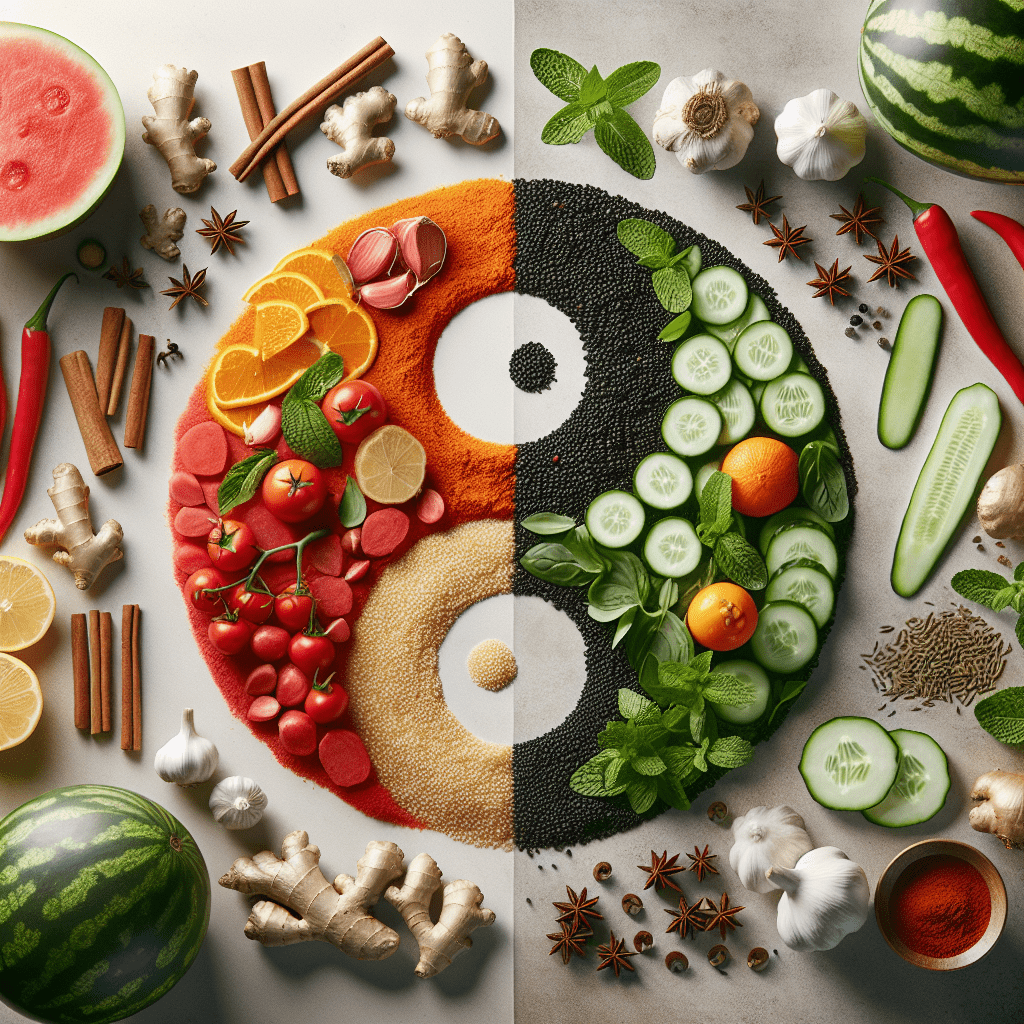In a world of fad diets, conflicting nutrition advice, and processed convenience foods, many of us find ourselves increasingly disconnected from what we eat. Meanwhile, rates of chronic diseases like diabetes, heart disease, and obesity continue to climb. What if the solutions to our modern health challenges have been around for thousands of years? Eastern nutritional wisdom offers time-tested approaches that view food not merely as fuel, but as medicine for the body and soul.
Long before nutritional science emerged in the West, Eastern cultures developed sophisticated systems for understanding how food affects our health. These ancient traditions from China, Japan, India, and other Eastern societies viewed nutrition as an integral part of medicine, not separate from it. They recognized that what we eat directly influences our physical well-being, mental clarity, and emotional balance.
“Food is the first medicine,” goes an ancient Chinese saying that encapsulates this philosophy. Unlike our modern approach that often treats symptoms after they appear, Eastern nutritional wisdom emphasizes prevention and maintaining harmony within the body. This holistic perspective might be exactly what we need to address the disconnection many of us feel with our food and our bodies.
Food as Medicine: The Foundation of Eastern Nutritional Wisdom
At the heart of Eastern nutritional wisdom is the concept that food is medicine. This isn’t just a poetic metaphor—it’s a practical approach to health that has guided dietary choices across Asia for millennia. In traditional Chinese medicine, for instance, foods are classified according to their energetic properties rather than just their nutritional content.
The yin-yang theory forms the cornerstone of this approach. Foods are categorized as either yin (cooling) or yang (warming), with the goal being to create balance within the body. If you’re experiencing a “hot” condition like inflammation or fever, cooling yin foods like watermelon, cucumber, or mung beans might be recommended. Conversely, if you’re dealing with “cold” conditions like poor circulation or fatigue, warming yang foods like ginger, cinnamon, or lamb could help restore balance.
The Five Elements theory takes this classification further, associating foods with the elements of wood, fire, earth, metal, and water. Each element corresponds to different organs and bodily systems. For example, sour foods relate to the wood element and support liver function, while bitter foods connect to the fire element and benefit the heart.
Mrs. Chen, a 72-year-old who grew up in a small village outside Shanghai, explains: “In our home, we didn’t go to the doctor for every little thing. My grandmother taught my mother, who taught me, how to use food to maintain health. When I had a cough, we made pear soup with honey and almonds. For summer heat, mung bean soup cooled the body. This wasn’t superstition—it was our medicine cabinet.”
This practical approach to using food therapeutically stands in stark contrast to our modern tendency to separate nutrition from medicine. By reintegrating these concepts, Eastern nutritional wisdom offers a preventative strategy that addresses the root causes of imbalance before they manifest as disease.
The Community Table: Social Bonds and Mindful Eating
Eastern nutritional wisdom extends beyond what we eat to how we eat. In many Eastern cultures, meals are communal affairs that strengthen social bonds and promote mindful consumption. This stands in sharp contrast to the Western habit of eating alone, often quickly and while distracted by screens.
In Japan, the practice of mindful eating is embodied in the concept of “ichiju-sansai“—one soup and three sides that make up a traditional meal. This balanced approach encourages variety and moderation, while the presentation in separate small dishes allows one to focus on each food’s distinct flavor and texture. The phrase “itadakimasu” spoken before meals expresses gratitude for the food and acknowledges everyone who helped bring it to the table.
Research increasingly supports what Eastern nutritional wisdom has long advocated: mindful eating improves digestion and satisfaction while reducing overconsumption. A study published in the Journal of Obesity found that mindful eating practices led to significant weight loss and improved eating behaviors among participants.
“When we eat together and focus on our food without distractions, we naturally eat less and enjoy it more,” explains Dr. Lin, a specialist in integrative medicine. “The Eastern approach to eating as a mindful, communal activity addresses many of our modern problems with food—from portion control to emotional eating.”
By adopting this aspect of Eastern nutritional wisdom, we can transform eating from a mechanical act of refueling to a meaningful practice that nourishes both body and spirit.
Harmony with Nature: Seasonal and Local Eating
Eastern nutritional wisdom places strong emphasis on eating in accordance with the seasons and local environment. This isn’t just environmentally conscious—it’s seen as essential for maintaining health by staying aligned with nature’s cycles.
Traditional Chinese medicine teaches that each season affects different organs and systems, requiring dietary adjustments throughout the year. Spring calls for light, leafy greens that support liver function and help the body detoxify after winter. Summer demands cooling foods to balance the heat, while autumn requires moistening foods to counteract dryness. Winter is the time for warming, slow-cooked foods that nourish and preserve energy.
“Our ancestors knew instinctively what modern nutrition science is only now confirming,” says Dr. Tanaka, who studies traditional Japanese dietary patterns. “Seasonal foods contain precisely the nutrients our bodies need during particular times of the year. Wild spring greens are rich in the vitamins we need after winter, while autumn fruits provide antioxidants that help prepare us for cold season.”
Beyond nutritional benefits, eating seasonally and locally connects us with our immediate environment and supports sustainable food systems. When we purchase from local farmers who follow traditional growing methods, we’re not just getting fresher, more nutritious food—we’re also supporting practices that often align with eastern nutritional wisdom about respecting the earth and its natural cycles.
Whole Foods, Whole Health: The Minimal Processing Principle
In an age when highly processed foods dominate our supermarket shelves, Eastern nutritional wisdom offers a refreshing counterpoint: focus on whole, minimally processed ingredients that retain their natural life force, or “qi” as it’s known in Chinese tradition.
Traditional Eastern diets typically feature a plant-heavy approach with smaller amounts of animal products, abundant vegetables, whole grains, fermented foods, and herbs and spices used for both flavor and medicinal properties. Processed sugar, refined flour, and manufactured food additives are notably absent from these traditional ways of eating.
Fermentation plays a particularly important role in Eastern nutritional wisdom. From Korean kimchi to Japanese miso to Indian dahi (yogurt), fermented foods feature prominently in Eastern cuisines. Modern research now confirms what these traditions have long known: fermented foods support gut health by providing beneficial probiotics and enhancing digestion.
“The traditional diet I grew up with in Korea centered around vegetables and grains, with meat used sparingly as a flavor component rather than the main attraction,” shares Su-Jin, a nutritionist who bridges Eastern and Western approaches. “Nearly every meal included something fermented—kimchi, doenjang (soybean paste), or gochujang (chili paste). These weren’t just condiments; they were considered essential for good digestion and immunity.”
By embracing this aspect of Eastern nutritional wisdom and choosing foods closer to their natural state, we can reduce our exposure to artificial additives while maximizing our intake of nutrients that work synergistically in their whole form.
Ancient Wisdom Meets Modern Science: The Convergence
What makes Eastern nutritional wisdom particularly relevant today is how modern scientific research increasingly validates many of its core principles. The ancient understanding that gut health affects overall wellness, for instance, aligns perfectly with current research on the microbiome and its influence on everything from immunity to mental health.
Similarly, the Eastern practice of using certain foods and herbs therapeutically has been supported by research identifying the bioactive compounds responsible for these effects. Turmeric’s anti-inflammatory properties, green tea’s antioxidant benefits, and ginger’s digestive support are just a few examples where modern science has caught up with traditional Eastern nutritional wisdom.
“We’re seeing an exciting convergence of ancient wisdom and cutting-edge science,” notes Dr. Williams, a researcher studying traditional diets. “The holistic approach of Eastern nutritional wisdom, which considers how foods interact with each other and with the individual’s constitution, offers a sophisticated framework that complements our more reductionist nutritional science.”
This integration represents the best of both worlds—the time-tested patterns of traditional wisdom combined with the precision and validation of scientific inquiry.
Eastern Solutions for Modern Health Challenges
The beauty of Eastern nutritional wisdom lies in its practical applications for our most pressing health concerns. For the millions suffering from chronic inflammation—the root of many modern diseases—Eastern traditions offer anti-inflammatory dietary patterns and specific therapeutic foods.
For weight management, the mindful eating practices and emphasis on plant-based, whole foods provide a sustainable approach that doesn’t rely on calorie counting or restriction. The focus on balance rather than extremes makes these approaches more maintainable long-term than many modern diets.
Stress—perhaps our most pervasive modern ailment—is addressed through foods that Eastern nutritional wisdom recognizes as calming to the nervous system. From adaptogenic herbs like ashwagandha and holy basil in Ayurvedic tradition to specific mushrooms and roots in Chinese medicine, these ingredients help the body build resilience to stress.
“When patients come to me with digestive issues, anxiety, or chronic fatigue, I often look to Eastern nutritional wisdom first,” explains Dr. Zhang, who practices integrative medicine. “The patterns of eating and specific food therapies from these traditions are particularly effective for the lifestyle-related conditions that plague modern society.”
By applying Eastern nutritional wisdom to our contemporary health challenges, we can address not just symptoms but underlying imbalances, potentially preventing diseases before they take hold.
Embracing Eastern Nutritional Wisdom in Your Daily Life
The good news is that incorporating Eastern nutritional wisdom into your life doesn’t require a complete lifestyle overhaul. Small, consistent changes can make a significant difference in how you feel and function. Here are some principles you might consider adopting:
- Start your day with warm water or tea instead of cold drinks, supporting gentle awakening of your digestive system.
- Incorporate a rainbow of vegetables into your meals, focusing on seasonal and local options when possible.
- Experiment with fermented foods like kimchi, kefir, or miso to support gut health.
- Practice mindful eating by removing distractions, chewing thoroughly, and expressing gratitude before meals.
- Learn about the energetic properties of foods and how they might balance your particular constitution.
- Use culinary herbs and spices not just for flavor but for their therapeutic properties.
As you explore Eastern nutritional wisdom, you may find yourself developing a more intuitive relationship with food and a deeper understanding of how what you eat affects how you feel.
Eastern nutritional wisdom reminds us that food can be our daily medicine, our connection to community and nature, and a source of balance in our often hectic lives. By embracing these ancient principles with an open mind and adapting them to our modern context, we can reclaim food as a powerful tool for healing and vitality. The solutions to many of our contemporary health challenges may indeed lie in these time-tested traditions that view food not just as fuel, but as fundamental medicine for body, mind, and spirit.




